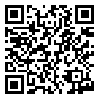BibTeX | RIS | EndNote | Medlars | ProCite | Reference Manager | RefWorks
Send citation to:
URL: http://jhsw.tums.ac.ir/article-1-5419-en.html
2- B.Sc. of Occupational Health Engineering, Health Faculty, Urmia University of Medical Sciences, Urmia, Iran
3- M.Sc. of Nursing, Nursing and Midwifery Faculty, Urmia University of Medical Sciences, Urmia, Iran
Introduction: Safety climate is the perception of personnel about the priority of safety in an organization. The objective of this study was to evaluate safety climate using Nordic questionnaire in a hospital.
Material and Method: In this cross-sectional study, 92 nurses working in different wards of a hospital in uromia city, Iran, filled out the NOSACQ-50 questionnaire. The responses of nurses were recorded with a 4-point Likert scale. The results were analyzed using descriptive and analytical statistics.
Results: Seventy-two percent of nurses were female and the remainders (28%) were men. The mean score of safety climate dimensions was different. “Management safety priority, commitment, and competence” and “Safety communication, learning, and trust in co-workers safety competence” dimensions obtained the lowest and the highest scores by nurses, respectively. The mean score of safety climate ranged 2.49 to 2.67 in different wards of the hospital. What is more, the mean safety climate was not statistically differed among nurses of various age and work experience categories (P-value> 0.05).
Conclusion: According to the results, it can be noted that the level of safety climate in the hospital was fairly good from the nurses’ viewpoint. However, attempts should be made to improve it, especially in the safety management related dimensions. Corrective control measures should be implemented in all wards of the hospital for all personnel with any age and work experience.
Received: 2016/06/18 | Accepted: 2016/06/18 | Published: 2016/06/18
| Rights and permissions | |
 |
This work is licensed under a Creative Commons Attribution-NonCommercial 4.0 International License. |





